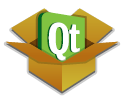Qt, Applications, OS's and you
We’ve heard much talk in the media of Nokia being silly for having both Symbian and MeeGo/Maemo, lacking applications and that they should just pick up Android to solve both problems but most of these people either have no idea what they’re talking about or are literally spouting out of their rear orifices :P. Either way, while I have my own opinions on the people who seem to do this as a career, I think I’ll stick to things a bit more pertinent to all of us reading this blog.
The first issue the media seems to bring up with regards to Symbian and MeeGo, even before using them or in the latter’s case is, “THERE AREN’T ANY APPS!!!!!” Now while that may be the case to an extent, it’s been bandied about very much in the developer sphere that coding with Symbian C++ and the dev tools available were difficult as all hell and somewhat antiquated and substandard respectively. While as I’m no coder, I can’t speak to the truth of these claims, the scarcity of QUALITY applications (both in functionality and visual flair) on the newer Symbian platform (S^1) and for the time being S^3would speak very much to an underlying issue at play.
Developing for Symbian  involves the following major steps:
1. Conceptualization
2. Research into the development tools, API’s available, SDK’s, debugging tools etc.
3. Coding
4. Testing
5. Symbian Signing
6. Publishing
The first 2 steps are pretty standard and the norm amongst developers looking at any platform but the latter 4 are where there have been issues with developing for Symbian.
3. Symbian C++ has been described as quirky, difficult to use and understand, possessing a steep learning curve and quite different from Standard C++. Â Given that code written using Symbian C++ is for all intents and purposes incompatible with other operating systems developers deciding to develop for Symbian would pretty much have to rewrite entire applications for use with other operating systems. Given the arduous nature of undertaking such a task (unless bankrolled by a massive corporation), the fact that Nokia uses not 1 but 3 major, application capable OS’s and the inability of developers for competing platforms to easily port applications to Nokia’s OS’s,(this ability would be a GREAT thing) or even between Nokia’s own OS’s, Nokia acquired and open-sourced the company Trolltech.
Trolltech is the company responsible for the lovely Qt Libraries & UI frameworks. While Nokia has gone about proclaiming the usefulness and beauty of Qt and what it means for developers, average Joe has yet to see and tangible benefits and even some of us “in the know” don’t fully understand what Qt is.
My following post, tomorrow if nothing goes awry, will discuss in detail:
1. What Qt is.
2. How does it work
3. How is it different from Java or other similar “Write once, deploy everywhere” frameworks
4. What are the benefits of using Qt going forward
5. Things that Qt support can/will bring to both the Symbian and MeeGo platforms
6. Things that Qt can be done using Qt in it’s current iteration, i.e API’s and tie-ins to existing OS’s .
7. Future Qt  releases
Category: Nokia






Connect
Connect with us on the following social media platforms.